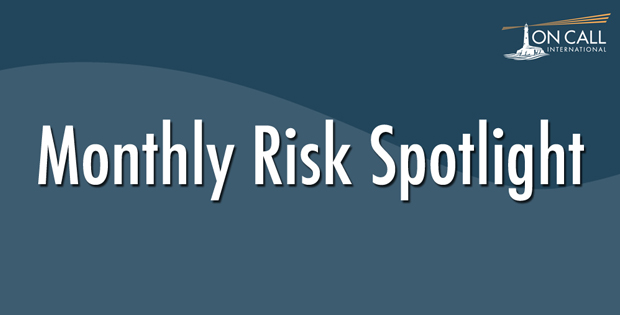We know that COVID-19 is top of mind for everyone right now and there are significant disruptions to travel across the globe. However, here at On Call, we want to ensure we are not becoming complacent on other risks for organizations that have essential operations ongoing amidst this crisis. As such, we hope you will continue to find our Monthly Risk Spotlights both helpful and informative as we highlight events of heightened importance in assessing risk to operations abroad.

AMERICAS
Protest Movement in Canada Creates Widespread Disruption
Environmentalists and Indigenous rights groups across Canada have created widely felt travel disruptions across the country as they demonstrate against a controversial pipeline in British Columbia. The pipeline, a 416-mile link called the Coastal GasLink between gas wells in the interior of British Columbia to a new liquefied natural gas terminal on the coast, was approved by both the British Columbia government and the elected councils of the Wet’suwet’en First Nation. However, many of the hereditary chiefs of the Wet’suwet’en First Nation are against the pipeline, seeing it as an affront to their traditional lands.
Protest sites have sprung up along railroads at several points across Canada, causing passenger and freight rail links to be blocked between major cities, Toronto, Montreal, and Ottawa. Protests in Vancouver have impacted the port, as well as bridges and downtown traffic. Highways have been blocked, politicians’ offices have become sit-in sites. So far, at least 47 protestors have been arrested. The countrywide demonstrations were initially spiked by the arrest of 21 protestors camped near the Coastal GasLink construction site.
The protests have created challenges for Prime Minister Justin Trudeau, who has vowed to mend the Canadian government’s relationship with its indigenous peoples, improve Canada’s carbon footprint, and also promote the Canadian oil and gas industry. The government has struggled to respond to the protests, even after judges granted an injunction against the protestors for blocking railways. The protests are now dying down in part due to COVID-19 restrictions and reconciliation efforts which led to a mutual agreement between the federal and provincial governments of Canada with the Wet’suwet’en councils. Despite that, tensions remain high. It thus remains to be seen whether the movement will gain a new life when the construction of the pipeline begins.
MIDDLE EAST AND NORTH AFRICA
Syrian Forces Make Push to Take M5 Highway
In February the Syrian government regained control of the M5 Highway for the first time in 8 years, a key victory for the Assad regime in its offensive against Idlib, Syria’s last rebel stronghold. Syrian troops backed by Russian aircraft achieved major advances in northwestern Idlib, retaking several towns and villages on both sides of the highway, including Saraqeb. The military advance has ignited tensions between Turkey and Russia, which back opposing sides in the Syrian conflict after 13 Turkish soldiers were killed in early February. In the ensuing conflict, Turkish-backed forces shot down 2 Syrian military helicopters, raising concerns of further confrontation and prompting thousands to flee the region. Turkey has since deployed reinforcements to the area while calling for Assad forces to withdraw behind a line of Turkish observation posts as laid out under a cease-fire agreement in 2018.
Control over the M5 Highway has long been deemed a strategic asset in Syrian’s civil war, both economically and militarily. The M5 highway functions as the backbone of Syria’s national road network, linking Syria’s capital, Damascus, with the northern city of Aleppo, Syria’s industrial hub, as well as the cities of Hama and Homs. Before the war, the highway was a key passageway for the crossing of wheat from northeast Syria to the rest of the country. Furthermore, it was heavily used for the exchange of commodities with regional trade partners such as Jordan and Saudi Arabia. By capturing the M5 highway Syria and Russia have sought to besiege the armed rebel opposition and cut its main supply routes from Turkish territory. Syria’s capture of Saraqeb, in particular, will facilitate its advance on Idlib; the M5 highway interconnects with the M4 highway in Saraqeb, opening up traffic from the government’s coastal stronghold of Latakia.
Going forward Turkey will likely tread very carefully on how it responds in Idlib. Turkey faces immense domestic pressure to retaliate after the killing of 13 Turkish soldiers by Syrian regime forces. However, it cannot afford a confrontation with Russia. Thus far, talks between Russia and Turkey have failed to reach an agreement, but both sides have agreed to continue negotiations. Furthermore, the resumption of Turkish-Russian joint patrols in other parts of Syria signals an easing of tensions.
ASIA-PACIFIC
The Islamic State’s Influence on the Maldives’ Tourist Industry
The Republic of Maldives has long been seen as a major tourist destination. The country’s myriad of islands and exotic beaches draws over one million tourists annually, accounting for approximately 28% of the archipelago’s GDP. Needless to say, the tourism industry is essential to the Maldivian economy. However, the nation’s ability to maintain its status as a major tourist destination may become increasingly difficult in the aftermath of a recent knife attack by an Islamic State-inspired group which garnered worldwide attention.
During the evening hours of Tuesday the 4th of February, one Australian and two Chinese tourists were stabbed in Hulhumale, near the Maldivian capital of Malé. Fortunately, all three victims suffered only minor injuries. Coinciding with the time of the attack, a video was released on social media showing three masked individuals claiming responsibility for the incidents. They pronounced their affiliation with the Islamic State and claimed the attack was aimed at eroding confidence in Maldivian tourist safety. All three men were detained by the authorities shortly after.
The Maldives has one of the world’s highest per capita rate of nationals traveling to Syria to join the Islamic State. Estimates vary widely but it is suspected that between 200 and 1,400 Maldivians have made the journey to date. It is also known that over 200 Maldivian men and women are still detained in Syria for having suspected Islamic State links. As has been seen globally, Islamic State affiliates returning to their homelands do not tend to abandon their radical ideologies, rather, they attempt to radicalize their fellow countrymen and carry on attacks domestically.
The Maldivian government recognizing the threats posed by Islamic State-inspired actors in the South Asian nation appears to have ramped up its counter-terrorism efforts. In the latter half of 2019, the government conducted various raids, which resulted in the arrest of numerous suspects, including a prominent recruiter for the Islamic State, Muhammad Ameen. While Ameen’s arrest has likely diminished the threat posed by the Islamic State in the Maldives, more needs to be done to ensure the security of the Maldives. Elsewise, the reputation of the Maldives as a safe location and tourist destination will be tainted.
SUB-SAHARAN AFRICA
Implications of Nigeria’s Latest Motorbike Ban
In February, the Nigerian government announced an official ban on commercial motorbikes in its major cities. One, in particular, is struggling to accept and adapt to this new reality. Nigeria’s largest city, Lagos, is home to approximately 20 million people, and the vast majority rely heavily on these motorbikes, either as a source of income or most practical mode of transport. However, what is for one group a means of survival is perceived as dreadful and third-rate to others. The usefulness of motorbikes in a buzzing city such as Lagos cannot be denied, but neither can their striking nuisance.
The government has defended its position by arguing that motorbikes not only exacerbated Lagos’ road congestion problem but were of major security concern. Reports suggest that Nigeria has one of the highest rates of road fatalities in the world, and motorbike drivers are the leading culprits. Due to their small size, the vehicles easily create route opportunities through the narrowest traffic lanes, sometimes on sidewalks, and swiftly zigzag without concern for their safety or that of others. They disregard traffic lights and traffic regulations to accomplish one goal: finish their ongoing trip as quickly as possible in order to get to the next. What is important to understand here is that most motorbike drivers are struggling to provide for themselves and for their dependents, thus their behavior comes from an instinct of survival rather than malicious intent. In addition, many of them are illiterate, some are minors who never received proper driving and safety training, and others are intoxicated due to lax rules of laws in the country. But the major security threat is created by a minority of motorbike drivers involved in a series of illicit activities such as mugging, purse snatching, express kidnapping, etc. Since the introduction of the motorbikes a few years back, the crime rate in the country, especially in the capital, Abuja, and Lagos has seen a drastic increase. The Nigerian government hopes this new ban will help reverse that trend.
From a traveler’s perspective, the ban is a major step towards reducing some of the major risks associated with any travel in Nigeria. That said, the ban has now created new commuting difficulties for locals. As millions of people lose access to their routine mode of transport, they all must now rely on the bus service the government provides. Although the government has promised to deliver new buses to meet overwhelming demand, the alternative mode of transport is proving inefficient. Buses cannot travel through narrow streets and to some remote areas where many people reside. Although motorbikes presented many problems, to the least they were practical to those who used them. As the most populous city in the country, Lagos is in dire need of a functional and well-organized commuter service. New options, such as structured boat transport, are being explored.
EUROPE/ CENTRAL ASIA
German Political Landscape Faces Growing Challenges
Germany is entering a period of political uncertainty following the sudden decision of Annegret Kramp Karrenbauer to resign as the leader of the Central Democratic Union (CDU) party. Karrenbauer was formerly projected as Angela Merkel’s likely successor to the German chancellorship in 2021. Karrenbauer is said to have resigned in protest following the revelation on the 6th of February that the CDU party aligned with the Alternative fur Deutschland (AfD) party to elect the State Premiere of Thuringia, a small state in central-eastern Germany.
The CDU has long maintained a policy of non-cooperation with the AfD party, due to the party’s extreme right-wing and neo-nazi tendencies. The AfD party is known to be anti-immigrant, anti-Semitic, and Islamophobic in ideological leaning. The decision to form an alliance in Thuringia caused a massive backlash amongst party officials and led Merkel to state that the decision was “unacceptable”. While more conservative ideologically than Merkel, Karrenbauer also believed the sudden shift in policy was unacceptable to the mission of the CDU party. Public protest has ensued with some members of the German population emotionally comparing the CDU’s decision to align with the AfD to the end of the Weimar Republic when centralist politicians agreed to form an alliance with Adolf Hitler.
Disenfranchisement in the former eastern part of the country, the refugee crisis, and an increased threat of terrorism have allowed the Afd Party to slowly gain a larger political base amongst the German population. The AfD party’s upsurge in popularity has led to a period of reckoning for centrist parties in Germany who have not had to seriously deal with the threat of radical elements entering German politics since the end of World War II. Members of the CDU party are divided on the best approach, with some members advocating for increased cooperation with the AfD, in order to maintain a measure of control over radical elements, and some members stating that the country’s National Socialist past should be taken as a lesson in refusing to negotiate with radical political parties. Karrenbauer’s decision to step down leaves open the possibility of a power vacuum that radical parties such as the AfD could take advantage of to gain increasing influence in German politics. In the coming months, it will be essential for the German centrist coalition to form a clear strategy in order to mitigate the influence of the radical right and reach a population of increasingly disaffected voters in East Germany.
Need help assessing the global risks affecting your travelers? Contact us today.




